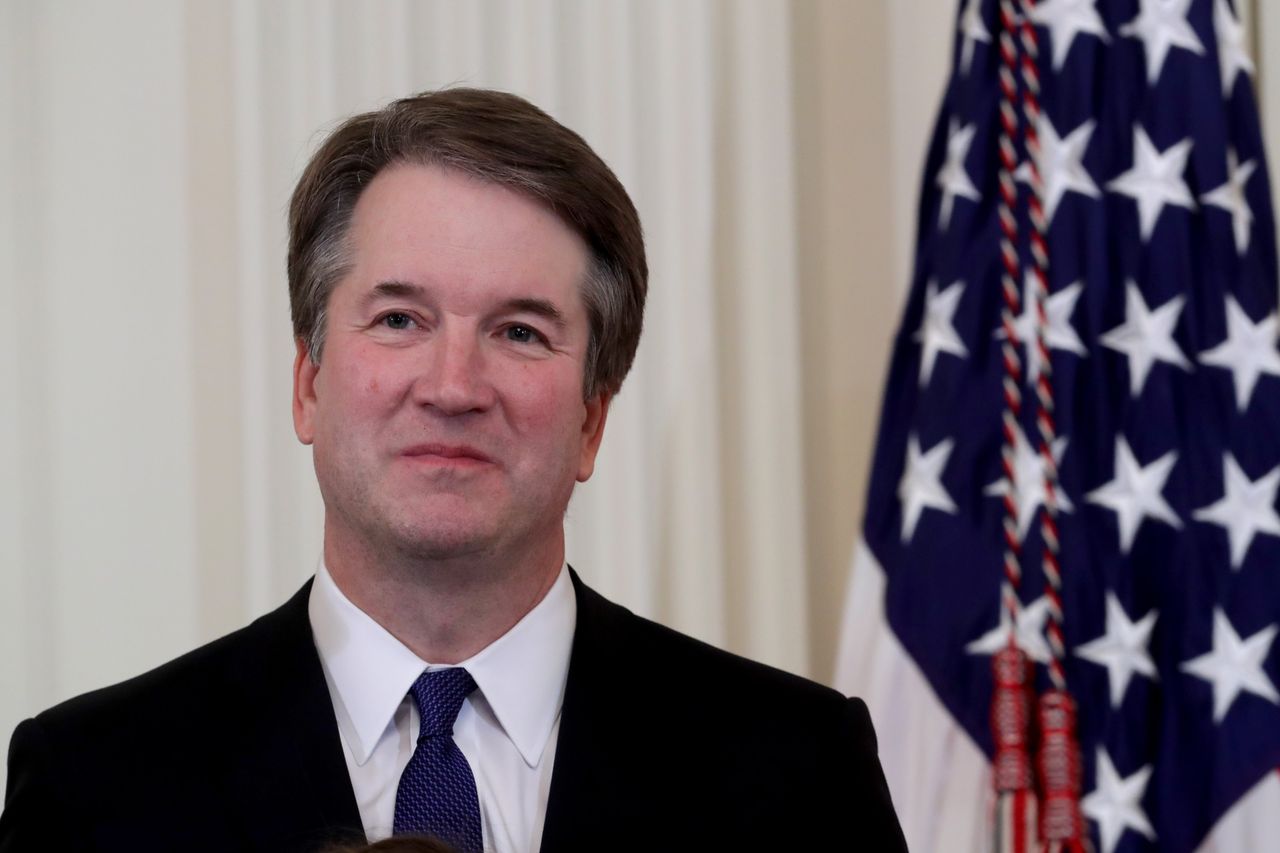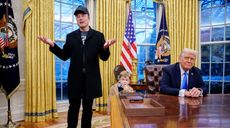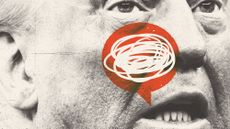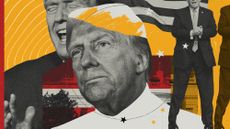Trump's surprisingly conventional Supreme Court pick
Kavanaugh carries the least amount of risk for Trump, and perhaps the greatest reward


In a day filled with suspense, intrigue, and sharp debate over the direction of the judiciary, the nation's most unconventional president showed a decidedly conventional approach to the Supreme Court. Almost two weeks after Justice Anthony Kennedy announced his retirement and changed the midterm election cycle, President Trump picked one of Kennedy's former clerks to replace him. Brett Kavanaugh, who has served for 12 years on the D.C. Circuit Court of Appeals, got the prime-time reveal at the White House.
Kavanaugh has been at the top of the conservative wish list for years. So the big surprise from Trump in this case is that there wasn't much surprise in the choice at all. To some extent, that's by design. Trump had to convince movement conservatives to turn out for him in 2016, but some argued that the famously mercurial Republican frontrunner couldn't be trusted to take the issue seriously nor to stick to his pledge to nominate conservatives to the federal bench. His campaign worked with conservative groups, notably the Federalist Society and the Heritage Foundation, to develop a list of more than two dozen potential Supreme Court candidates. The list was impressive enough to win over many conservatives, especially given the alternative of having Hillary Clinton make these same appointments.
Trump has treated that list as a playbook ever since. When he took office, he immediately chose Neil Gorsuch from the list to replace the late Justice Antonin Scalia. Trump also selected some on the list for appellate court appointments, such as Don Willett from the Texas Supreme Court and Notre Dame law professor Amy Coney Barrett. It came as no shock that Trump went right back to the same resource to look for his second appointment to the Supreme Court.
Subscribe to The Week
Escape your echo chamber. Get the facts behind the news, plus analysis from multiple perspectives.

Sign up for The Week's Free Newsletters
From our morning news briefing to a weekly Good News Newsletter, get the best of The Week delivered directly to your inbox.
From our morning news briefing to a weekly Good News Newsletter, get the best of The Week delivered directly to your inbox.
What is a little surprising, however, is that Trump chose a candidate who identifies strongly with the establishment Trump campaigned against two years ago. As a jurist, Kavanaugh has long been seen as a conservative's conservative, but he's worked as long in the political sphere as in the judiciary. As The Associated Press pointed out, "Kavanaugh was even born inside the Beltway and has lived there virtually his entire life." After clerking for Kennedy at the Supreme Court, Kavanaugh went to work on Ken Starr's independent counsel probe of former President Bill Clinton and Whitewater, which resulted in Clinton's impeachment. He joined George W. Bush's campaign and worked on the legal challenges surrounding the 2000 election, then served five years in the Bush White House before moving to the D.C. Circuit in 2006.
One would think Trump would have balked at Kavanaugh's closeness to the political and legal establishment. Tapping Barrett, on the other hand, would have given him an opportunity to fire up his political base and to dare opponents to stop her. Raymond Kethledge, another name on the list, has a decade on the 6th Circuit, and hails from Michigan, a state Trump will need to hold in 2020. Pennsylvania native Thomas Hardiman, a runner-up to Gorsuch in 2017 as well as to Kavanaugh now, has served 11 years on the 3rd Circuit in another critical state for Trump's political hopes.
And yet Trump played it safe this time around, at least in dealing with the Republican establishment. That's no knock on Kavanaugh, nor a critique of his judicial temperament; there too, Trump has played it safe. Kavanaugh has been at times a lonely conservative voice in a liberal-leaning circuit. His track record in decisions and dissents makes it clear that Kavanaugh is unlikely to become another David Souter, a particular bete noire among conservatives who still smolder over Souter's development into a liberal voice on the Supreme Court.
That's not to say that Kavanaugh is a risk-free candidate. In another era, Senate Democrats would have filibustered this nomination to death as payback for the Clinton impeachment as well as Kavanaugh's contributions to Bush v. Gore after the 2000 election. Thanks to reflexive rule changes, Democrats can't stop Kavanaugh from getting confirmed without Republican defections, but they can make his journey through the Senate as unpleasant as possible — and likely will, in order to satisfy their base. Kavanaugh had a similarly rough ride in 2006 before getting a pass on confirmation on a 57-36 vote. Trump's opponents might have had a tougher time doing that to either Kethledge or Hardiman, although perhaps the tenor of the times would have required them to try anyway, regardless of whom Trump nominated.
Still, on balance, Kavanaugh carried the least amount of risk and perhaps the broadest benefit. Having won the political world by attacking the old order, perhaps Trump is now looking ahead to a tough 2020 fight and knows he needs to bridge the establishment and the populists together. The Supreme Court list arguably won Trump one election by giving conservatives and establishment figures a reason to vote for him, and this choice underscores Trump's value to them for another term. When it comes time to vote in an other presidential election, Trump's appointments to the judiciary will certainly position him as the safe choice for everyone to the right of the Democrats. That might make Kavanaugh's nomination the most conventional act Trump will make as president.
Sign up for Today's Best Articles in your inbox
A free daily email with the biggest news stories of the day – and the best features from TheWeek.com
Edward Morrissey has been writing about politics since 2003 in his blog, Captain's Quarters, and now writes for HotAir.com. His columns have appeared in the Washington Post, the New York Post, The New York Sun, the Washington Times, and other newspapers. Morrissey has a daily Internet talk show on politics and culture at Hot Air. Since 2004, Morrissey has had a weekend talk radio show in the Minneapolis/St. Paul area and often fills in as a guest on Salem Radio Network's nationally-syndicated shows. He lives in the Twin Cities area of Minnesota with his wife, son and daughter-in-law, and his two granddaughters. Morrissey's new book, GOING RED, will be published by Crown Forum on April 5, 2016.
-
 Javier Milei's memecoin scandal
Javier Milei's memecoin scandalUnder The Radar Argentinian president is facing impeachment calls and fraud accusations
By Chas Newkey-Burden, The Week UK Published
-
 Who is actually running DOGE?
Who is actually running DOGE?TODAY'S BIG QUESTION The White House said in a court filing that Elon Musk isn't the official head of Donald Trump's Department of Government Efficiency task force, raising questions about just who is overseeing DOGE's federal blitzkrieg
By Rafi Schwartz, The Week US Published
-
 How does the Kennedy Center work?
How does the Kennedy Center work?The Explainer The D.C. institution has become a cultural touchstone. Why did Trump take over?
By Joel Mathis, The Week US Published
-
 'Seriously, not literally': how should the world take Donald Trump?
'Seriously, not literally': how should the world take Donald Trump?Today's big question White House rhetoric and reality look likely to become increasingly blurred
By Sorcha Bradley, The Week UK Published
-
 Will Trump's 'madman' strategy pay off?
Will Trump's 'madman' strategy pay off?Today's Big Question Incoming US president likes to seem unpredictable but, this time round, world leaders could be wise to his playbook
By Sorcha Bradley, The Week UK Published
-
 US election: who the billionaires are backing
US election: who the billionaires are backingThe Explainer More have endorsed Kamala Harris than Donald Trump, but among the 'ultra-rich' the split is more even
By Harriet Marsden, The Week UK Published
-
 US election: where things stand with one week to go
US election: where things stand with one week to goThe Explainer Harris' lead in the polls has been narrowing in Trump's favour, but her campaign remains 'cautiously optimistic'
By Harriet Marsden, The Week UK Published
-
 Is Trump okay?
Is Trump okay?Today's Big Question Former president's mental fitness and alleged cognitive decline firmly back in the spotlight after 'bizarre' town hall event
By Harriet Marsden, The Week UK Published
-
 The life and times of Kamala Harris
The life and times of Kamala HarrisThe Explainer The vice-president is narrowly leading the race to become the next US president. How did she get to where she is now?
By The Week UK Published
-
 Will 'weirdly civil' VP debate move dial in US election?
Will 'weirdly civil' VP debate move dial in US election?Today's Big Question 'Diametrically opposed' candidates showed 'a lot of commonality' on some issues, but offered competing visions for America's future and democracy
By Harriet Marsden, The Week UK Published
-
 1 of 6 'Trump Train' drivers liable in Biden bus blockade
1 of 6 'Trump Train' drivers liable in Biden bus blockadeSpeed Read Only one of the accused was found liable in the case concerning the deliberate slowing of a 2020 Biden campaign bus
By Peter Weber, The Week US Published